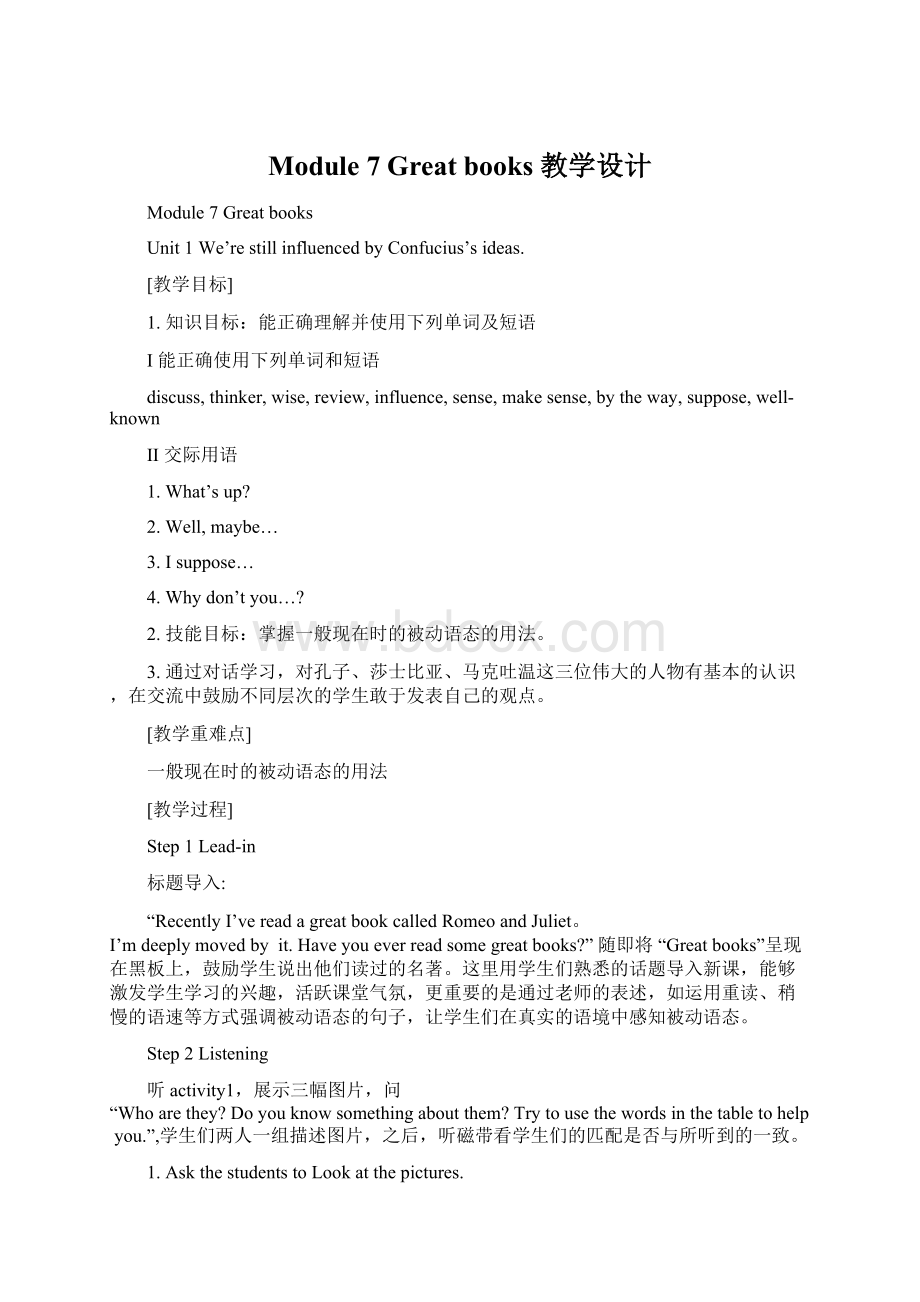Module 7 Great books 教学设计Word格式.docx
《Module 7 Great books 教学设计Word格式.docx》由会员分享,可在线阅读,更多相关《Module 7 Great books 教学设计Word格式.docx(22页珍藏版)》请在冰豆网上搜索。

called
Romeo
and
Juliet。
I’m
deeply
moved
by
it.
Have
you
ever
some
books?
”
随即将“Great
books”呈现在黑板上,鼓励学生说出他们读过的名著。
这里用学生们熟悉的话题导入新课,能够激发学生学习的兴趣,活跃课堂气氛,更重要的是通过老师的表述,如运用重读、稍慢的语速等方式强调被动语态的句子,让学生们在真实的语境中感知被动语态。
Step2Listening
听activity1,展示三幅图片,问“Who
are
they?
Do
know
something
about
them?
Try
to
use
the
words
in
table
help
you.”,学生们两人一组描述图片,之后,听磁带看学生们的匹配是否与所听到的一致。
1.AskthestudentstoLookatthepictures.
2.Saywhotheyareandwhytheyarefamous.
3.Playtherecordingandaskthestudentstolistencarefully.
4.Nowlistenandcheckyouranswers.
5.Askthestudentstochecktheiranswerwithapartner.
6.Callbacktheanswersfromthewholeclassandchecktheanswers.
Step3Listeningcarefully
1.Askthestudentstoreadthroughanswerthesentences.
1)Confuciusiswell-knownin_______________.
2)Shakespearewrote______________________.
3)MarkTwain’sstoriesareset__________________oftheUS.
2.Playtherecordingandaskthestudentstolistencarefully.
3.Listenandcompletethesentences.
4.Askthestudentstochecktheiranswerwithapartner.
5.Callbacktheanswersfromthewholeclassandchecktheanswers.
6.Nowlistenandcheck.
Step4Listenandread
(一)学生自主学习,理解activity3的意思,找出不懂的地方。
(二)小组内合作解决不懂的地方,再有疑难,小组间共同解决,教师适时点拨。
1.Showsomepictures,andaskthestudentstotalkaboutthem.
2.Askthestudentstoreadtheconversationsilently.
3.Playtherecordingandaskthestudentstolistenandreadtheconversation.
4.Readtheconversation.
5.Actitout.
6.Matchthepeoplewiththedescriptions.
(1)Askthestudentstoreadtheconversationagain.
(2)ReadtheinformationinActivity3.
1)Confucius2)Shakespeare3)MarkTwain
a)Hewasaverywiseman.
b)Heisnotaswell-knownastheothertwopeople,buthisworksarestillpopular.
c)Hisplaysarereadbymillionsofpeople.
d)Hewasmoreateacherandthinkerthanawriter.
e)Peoplearestillinfluencedbyhisideas.
3.Nowmatchthepeoplewiththedescriptions.
5.Callbacktheanswerfromthewholeclassandchecktheanswer.
Keys:
1.a),d),e)2.c)3.b)
Step5Finishtheactivity4.
1.AskthestudentstothewordsintheboxinActivity4.
acceptdiscussinfluencereviewsensethinkerwise
2.AskthestudentstoreadthroughthepassageinActivity4.
MrJacksonandBettyare
(1)____________greatwriters.BettyexplainsthatinherInternetgroup,eachpersonreadsafavouritebookandthenwritea(n)
(2)____________ofit.MrJackson(3)____________thatConfuciusandShakespearearegreatbecausetheirworksarestillreadbypeopletoday,buthethinksConfuciuswasmoreateacherand(4)____________thanawriter.HesaysthatConfuciuswasavery(5)____________man.MrJacksonthinksthatwearestill(6)____________byConfucius’sideasandthatShakespeare’splaysstillmake(7)____________topeopletoday.
3.Completethepassagewiththecorrectformofthewordsinthebox.
4.Checkwithapartner.
5.Callbacktheanswersfromthewholeclass.
1.discussing2.review3.accepted4.thinker5.wise
6.influenced7.sense
Step6EverydayEnglish
让学生们说说这些句子在文中的意思。
What’sup?
Well,maybe…
Isuppose…
Whydon’tyou…?
Step7Pronunciation
1)跟读录音朗读文章,模仿语音语调
2)读熟文章
3)画出重读的句子
1.Playtherecordingoncewithoutstopping.
2.Playtherecordingagainandaskthewholeclasstorepeat.
1)We’restillinfluencedbyConfucius’sideas.
2)Shakespeare’splaysalsomakealotofsensetoustoday.
3)Hewasimportant,butIsupposeheisn’taswell-knownasConfuciusorShakespeare.
3.Askthestudentstolistenandunderlinethewordsthespeakerstresses.
4.Nowlistenagainandrepeat.
Step8Groupworkandspeaking
1.Workingroups.Doyouagreewiththefollowingopinions?
Giveyourreasons.
1)TeahouseisoneofthegreatestplaysinChina.
2)EveryoneshouldlearnsomeTangpoems.
3)Weshouldonlyreadbooksbygreatwriters.
Iaccept…
Iagree/don’tagreewith…
Ithink…
2.Nowreporttheideasofyourgrouptothewholeclass.
Mostofusthink…Wethinkwelearn…
3.Workingroups.
Step9Languagepoints
是一种非正式的用法,意思是“怎么了/出什么事了?
”例如:
Youlookveryworried?
怎么了?
你看上去很焦虑。
2.ButIthinkI’ddescribeConfuciusmoreasateacherandthinkerthanawriter.
这里的Confucius指孔子,为“孔夫子”的英语译名,是长期以来约定俗成的译法。
more…than…在本句中表示“与其说是…不如说是…”。
例如:
Successismorehardworkthangoodluck.成功来自努力,而非好运。
3.…andShakespeare’splaysalsomakealotofsensetoustoday.…
makesense的意思是“合情理;
明智;
有意义”。
NowonderhowItriedtoreadit,thesentencestilldidnotmakeanysensetome.不管我们怎么努力地读,我还是不懂这个句子的意思。
Whydidshedosuchathing?
Itdoesnotseemtomakesense.她为什么做这样的事?
似乎没有道理。
4.IwanttojoinanInternetgrouptodiscussgreatbooksbygreatwriters.
discussv.讨论;
谈论
discuss的过去分词是discussed,现在分词是discussing,
discusssth.(withsb.)和某人谈论某事
e.g.Wewilldiscusstheplanswiththematthemeeting.
我们将和他们在会议上讨论这个计划。
5.We’restillinfluencedbyConfucius’sideas.
influencev.影响;
作用于
influence用作动词时,后面直接跟宾语,常可用于influencesb.todosth.结构。
e.g.Whatinfluencedyoutotakethejob?
什么影响你接受这份工作?
6.Bytheway,whatdoyouthinkofMarkTwain,…
bytheway用于转入新的话题,意为“顺便说;
附带说”。
e.g.Bytheway,haseverybodyarrived?
顺便问一句,大家都到了吗?
7.Hewasimportant,butIsupposeheisn’taswell-knownasConfuciusorShakespeare.
supposev.猜想;
推测;
相信;
认为
后面可以带动词不定式的复合结构或从句,也常用于besupposedto结构。
e.g.Isupposehimtobeonduty.
我想他在值班。
Wearenotsupposedtosmokehere.
我们不应该在这儿吸烟。
well-knownadj.众所周知的;
著名的
bewell-knownas意为“作为……而著名”,相当于befamousas。
e.g.NormanBethunewaswell-knownasagreatdoctor.
白求恩作为一个伟大的医生而著名。
拓展:
bewell-knownfor意为“因为……而著名”,相当于befamousfor。
除v-ing形式外,for后还可跟名词。
e.g.YuanLongpingiswell-knownforhybridrice.
袁隆平因杂交水稻而著名。
8.小组自我补充
9.学生自主完成这些重点与难点。
自主完成后,小组合作,交流学习成果,共同释疑。
让学生朗读以上重点知识。
Step10中考链接
A.单项选择:
1.Experts________tomakesuggestionstohelphimdevelop.
A.willinviteB.areinvitedC.haveinvited
2.HanHan’sbooksarepopular.They________bymanyteenagers.
A.arereadingB.arereadC.wereread
3.—Atpresent,oneofthebestwaystostudyisworkingingroups.
—Morechances_______tostudentstolearnfromeachother.
A.offerB.areofferedC.haveoffered
4.—Don’tyouseethesign“NoParking!
”ontheright?
—Sorry,Ididn’t.ButnowIknowparking______here.
A.wasn’tallowedB.isn’tallowedC.won’tallowD.doesn’tallow
1.B2.B3.B4.B
B.完成句子:
1.我试图让每首歌都体现出它自己的意义。
Itrytomakeeachsong____________foritself.
2.顺便问一下,你认为这个队的水平如何?
_____________,whatdoyouthinkaboutthisTeam?
3.今天很多人仍然看孔子的作品。
Confucius’works______________bymanypeopletoday.
4.学校鼓励学生大声地讲英语。
Allthestudents______________speakEnglishloudly.
5.我们受到孔子思想的影响。
We_____________byConfucius’sthoughts.
1.makesense2.Bytheway3.arestillread4.areencouragedto5.areinfluenced
Step11Homework
RememberthewordsofUnit1andpreparethetextofUnit2.
Unit2Itisstillreadandloved.
一、教学目标
1.语言知识目标:
理解adventure,getintotrouble,runaway,escape,cave,dead,foratime,neighbour,funeral,surprised,alive,southern,state,payfor,action,everyday,dialogue在文中的意思,并能正确地翻译。
2.Keysstructure:
Sentencestructure.
2.语言技能目标:
说:
能谈论自己喜爱的名著及喜欢的理由。
读:
通过阅读abookreviewofTheAdventuresofTomSawyer让学生掌握并运用略、精读的技巧,即略读找大意,精读搜索相关信息。
3.情感态度目标:
通过了解名著及著名作家,激发学生阅读名著及了解著名作家的兴趣。
二、教学过程
Step1Revision
Lookatthepicturesandsaywhotheyareandwhytheyarefamous.
Confucius
ConfuciuswasagreatteacherandthinkerinancientChina.Helivedover2000yearsagoandheiswell-knowninmanycountries.
Shakespeare
WilliamShakespearewasEnglishandwroteplaysandpoems.Althoughhediedabout400years,hisplaysarestillseen,andhispoemsarestillreadbymanypeople.
MarkTwain
MarkTwainwasanAmericanwriter.HisstoriesaresetinthesouthoftheUSover100yearsago,andreadersstillenjoythemverymuch.
Step2Scanning(略读)小组讨论,最后得出答案。
1.ReadthefirstparagraphofthepassageinActivity2quickly.
2.Trytoanswerthequestions.Usethewordsandexpressionintheboxtohelpyou.
adventureheronineteenthcenturytreasure
1)WhatkindofstoryisTheAdventuresofTomSawyer?
2)Whenandwhereisthestoryset?
3.ReadthepassageandcheckyouranswerstoActivity1.
1.Ittellssomeexcitingstoriesaboutaboywhohasmanyadventures.
2.ThestoryissetinthetownofSt.Petersburg,Missouri,theUS,inthenineteenthcentury.
Step3Extensivereading(精读).
1.Playtherecordingandlistentothetapecarefully.
2.Askthestudentstoreadthroughthepassage.
3.Askthestudentstoreadthepassagebythemselves.
4.Readthetexttogether.
Completethetable.
1.Readthepassageagain.
2.CompletethetablewiththeinformationaboutTheAdventuresofTomSawyer.
TheAdventuresofTomSawyer
Yourfavouritebook
Writer
1.
Placewherethestoryisset
2.
Maincharacters
3.
Storiesthebooktells
4.
Theme
5.
Features
6.
3.Checkwithapartner.
4.Callbacktheanswersfromthewholeclass.
1.MarkTwain
2.StPetersburg,Missouri,America
3.TomSawyer,HuckFin